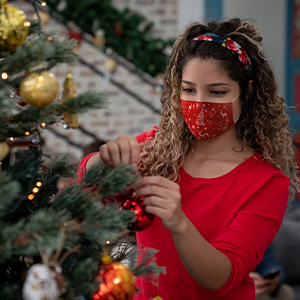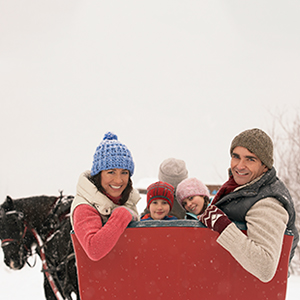Family Gathering Guidelines for the Holidays (and Other Milestones)

The holiday season is upon us, which often means more get-togethers with family and other loved ones. But with the COVID-19 surge in northern Michigan (and the highest community positivity rate we’ve experienced here in our region to date) celebrating the holidays or other milestones could put you or your loved ones at risk. Here’s what to do if you’re gathering with loved ones outside your immediate household.
Wear a Mask

When worn properly, masks are a highly effective tool that helps stem viral spread. Masks work by preventing you from spreading and/or coming into contact with airborne droplets due to coughing, sneezing, and even the simple act of talking. Regardless of your vaccination status, wearing a mask indoors when you’re around people outside your immediate household is critical at this time due to the statewide COVID-19 surge that is impacting our region in particular.
The current spike in our region’s positivity rate (which is higher than ever before) combined with an uptick in flu and other upper respiratory illnesses (like RSV in children) means that masking should be an expectation for everyone over the age of two at any indoor gathering as well as crowded outdoor settings.
Even if your company is fully vaccinated, which is generally safer, consider the risk of spreading the virus to our most vulnerable, including the elderly, people who are immunocompromised, and young children under the age of 5. Finally, avoid gathering in stuffy, poorly ventilated areas that don’t provide a lot of personal space.
Sick? Been Exposed? Stay Home.

Even before the pandemic, we’ve all encountered an acquaintance or loved one who decides to attend a get-together while fighting off an illness. In the age of COVID, this decision is no longer just uncomfortable for everyone else, it’s also quite dangerous.
The domino effect of exposing others to the virus, who in turn could become severely ill themselves or spread it to someone else is considerable. No one wants to feel responsible for exposing anyone to this virus – and no gathering is worth taking that risk.
If you’re not sick or feeling symptoms, but you’ve been exposed to someone with COVID-19, get tested and wait for the results before you expose others in your circle.
Get Tested
Whether you’re traveling or gathering with friends and family outside your household, we strongly urge you to get a COVID-19 test. Plenty of people without symptoms have unknowingly spread COVID-19 to others – and just because you’re asymptomatic, not everyone reacts to the virus the same.
Testing is easier and much more convenient than it was around the beginning of the pandemic, and the results are available in anywhere from 15 minutes to a few days.
Get Vaccinated

Data, including numbers we’re seeing at Munson Healthcare, continues to stress that the unvaccinated are at a much higher risk of COVID-induced complications.
Not just limited to older adults, people of all ages who aren’t yet vaccinated – including young children – are at a much more significant risk of both getting COVID-19 and requiring hospitalization to treat symptoms.
These significant symptoms include:
- difficulty breathing
- shortness of breath
- confusion
Protecting yourself and your loved ones has never been more critical than now. Exposure to others outside your immediate household (even if they’re family) is what puts you at risk.
While it may be too late to be fully vaccinated for holiday gatherings (which is 2 weeks after your one-dose or two-dose vaccine series is completed), one dose still gives you a degree of protection, which is better than no protection at all! Just be sure to schedule your second dose if you get the Pfizer or Moderna two-dose series.
Though COVID-19 tends to steal the spotlight, don’t forget the other respiratory illnesses that thrive as the weather gets colder. While preventing those pesky winter colds can be challenging, vaccines are available for harsher illnesses like the flu – and this year’s flu shot contains protection against four common influenza strains.
Getting a flu shot alongside your COVID-19 shot or booster, which can be done safely at the same time, protects you from two potentially severe and even life-threatening diseases.
Limit and prioritize gatherings
If you’re at higher risk of getting or becoming severely ill from COVID-19, reconsider the number of holiday gatherings you plan to attend – especially those that are indoors.
If your family plans to get together and includes small children under the age of 5, someone who’s immunocompromised, or elderly family members whose health you’re trying to protect, consider changing your plans with other groups of people. Do a virtual drop-by, plan something fun outside, or reschedule in the weeks following your family party.
Avoid Activities or Situations That May Cause Anxiety

Regardless of vaccination status, it’s normal and common to fear a COVID-19 infection. No one wants to get sick with what could feel like an intense flu (or worse), spend earned PTO recovering from an illness, and even potentially be hospitalized for severe symptoms.
If you’re hosting, plan for activities that help people feel more comfortable – like physically distanced party games. If you’re “guesting,” pack your hand sanitizer and an extra mask.
Feeling uncomfortable gathering this holiday season? Consider a non-traditional outdoor event:
- Grill pizzas outside on a deck with a gas heater to help stay warm
- Meet by a bonfire for cocoa and holiday treats
- Take the family to a local sledding hill
- Hike or snowshoe your favorite trail and tailgate picnic at the trailhead
For more ideas on how to have fun outside this holiday season, check out this blog from Munson Healthcare.
Meeting virtually with loved ones this year? Help keep kids engaged in the conversation with these tips.
Don’t Forget the Basics…
- Don’t eat or nibble without washing your hands first.
- Avoid touching your face.
- Cough and sneeze into a tissue and discard – or use your elbow if a tissue isn’t immediately at hand.
Who’s at Highest Risk?
- People with compromised immune systems (regardless of vaccination status)
- Adults who aren’t fully vaccinated
- Children who are not yet fully vaccinated, including children under 5 who are currently ineligible.
Don’t Risk Your Health
Millions of people in the United States have received COVID-19 vaccines under the most intense safety monitoring in history. Serious adverse side effects are incredibly rare. COVID-19 vaccines are safe, effective, and authorized for ages five and up. In the rare chance of infection, there is no better way to reduce your risk of hospitalization and serious illness.
If you have questions or concerns, please speak with your primary care provider. You can also visit munsonhealthcare.org/ACT or call Munson Healthcare Ask-A-Nurse at 231-935-0951.